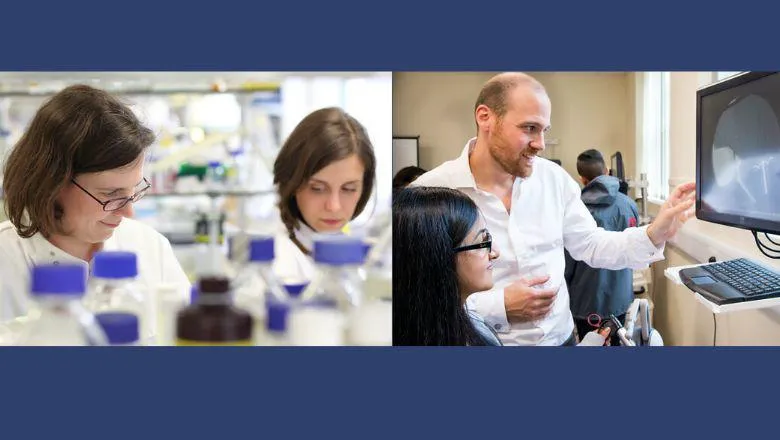Biological sciences, environmental sciences and physical sciences at King's will all benefit from a share of over £500 million invested in doctoral students, announced by UK Research and Innovation (UKRI) on 13 November 2024

This investment from UKRI, through the Biotechnology and Bioscience Research Council (BBSRC), the Engineering and Physical Sciences Research Council (EPSRC) and the Natural Environment Research Council (NERC), supports doctoral students to develop their skills and experience across many of King's areas of research strength.
Skills the students develop will prepare them for a diverse range of careers, both in research and innovation and across the public and private sectors. At least 25% of studentships will be delivered in collaboration with non-academic partners.
King's is a key partner in two consortiums that are receiving significant funding.
The London Interdisciplinary Doctoral training consortium (LIDo), will support 130 PhD bio-scientists over the next five years. In addition to this UKRI funding, LIDo will create additional studentships funded by external partners including from industry.
LIDo works closely with external collaborators across multiple sectors, including Unilever, Royal Botanic Gardens Kew, the Natural History Museum, Animal and Plant Health Agency, Food Standards Agency, Discovery Park, and the Alan Turing Institute.
LIDo has been training PhD students since 2012. The new funding will include projects combining bioscience with artificial intelligence and advanced computation.
Professor Jeremy Green, Centre for Craniofacial Regeneration and Biology, the King's lead for the LIDo consortium said:
The renewal of LIDo funding by the BBSRC is great news for King's. LIDo continues to be a leader - not only in its longstanding emphasis on combining biology lab experiments with computational and other "dry" science approaches to biotech and bioscience, but also at the forefront of student equality, diversity and inclusion, cohort development, and international recruitment. In an increasingly competitive funding environment, this is a testament to the excellence of our PhD training provision.
Professor Jeremy Green
The Training Research and Equity in Environmental Sciences (TREES) Doctoral Landscape Award, will support 65 environmental science PhD students over the same period.
King's is working in partnership with nine other academic institutions, led by UCL, and aims to address critical environmental challenges through interdisciplinary environmental sciences. The TREES Doctoral Landscape Award will train the next generation of researchers to address global challenges, including climate change, biodiversity loss, and ecosystem resilience.
TREES will empower students to develop innovative, cross-disciplinary solutions while fostering impactful partnerships with over 80 external collaborators, including NGOs, charities, industry leaders, and public sector organisations.
Professor Mark Mulligan, the King's academic lead for TREES, said:
We are delighted that NERC have funded the TREES Doctoral Landscape Award, in which King's is a key academic partner. The award will enable collaborative PhD projects between the ten hosting partners and a wide range of collaborating organisations. It will help us develop a dynamic new PhD training and research programme that will equip the next generation of environmental scientists to tackle today's critical global challenges.
Professor Mark Mulligan
Both programmes were awarded funding following a national competition for 2024 Doctoral Landscape Awards led by BBSRC and NERC. In total, BBSRC and NERC are investing £293 million in more than 2,300 studentships over five years.
In addition, the EPSRC is investing £279 million in university doctoral landscape awards over the same period.
King's EPSRC Doctoral Landscape Award (~ £6.8m) will support more than 60 new PhD students across key strategic themes in science and engineering, e.g. Net Zero technologies, Quantum technologies, AI, computational modelling applied to health sciences and imaging sciences, engineering biology, and studies of human and synthetic minds. At least 25% of EPSRC DLA projects will be in collaboration with industry partners, offering doctoral students valuable opportunities to enhance their collaborative and interdisciplinary skills through practical, work-based experiences. This enables access to world-class industrial facilities and expertise, encourages contributions to real-world problem-solving, and helps students establish and grow professional networks, expanding their career prospects.
Dr Nigel Eady, Director of Research Talent, said:
EPSRC doctoral funding enables us to attract the very best students to King's, develop close & productive partnerships with industry and produce world-leading research that transforms society. King's is fully committed to empowering the next generation of researchers to achieve their ambitions and our Doctoral College is at the heart of this commitment.
Dr Nigel Eady
Partner Institutions:
The TREES partnership includes King's College London, UCL, Birkbeck, Brunel, Queen Mary University of London, the Natural History Museum, Royal Botanic Gardens Kew, Royal Holloway, University of London, University of Portsmouth, and ZSL Institute of Zoology.
LIDo comprises eight leading London universities: King's College London, UCL, Queen Mary University of London, Royal Veterinary College, Birkbeck, University of London, the London School of Hygiene and Tropical Medicine, Royal Holloway, University of London and University of Greenwich's Natural Resources Institute.









